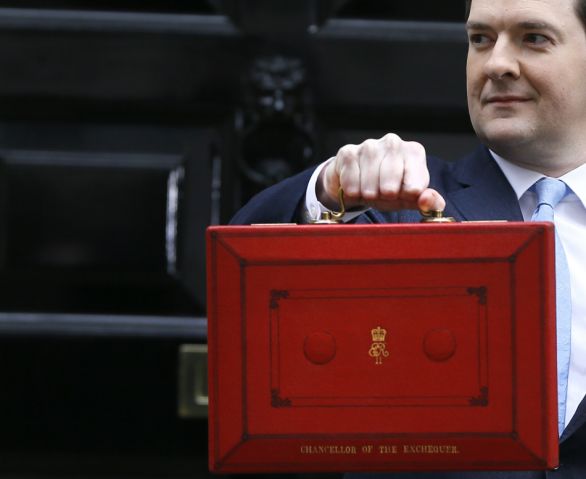£9bn black hole: Painful tax rises likely to hit households after next election as George Osborne is accused of fudging deficit figures
Chancellor under fire as Labour attacks £2.2bn 'raid' on NHS to honour borrowing pledge

Households and businesses should brace for painful tax rises after the next election to fill a £9bn hole in public finances, a leading economic think-tank warned today.
The Institute for Fiscal Studies (IFS) was also scathing about what it described as the last-minute manipulation of departmental budgets ahead of the Budget in order to save George Osborne the embarrassment of having to report that Britain’s annual deficit was rising, rather than falling.
It said its analysis revealed that without new tax rises government spending would have to be cut by 18 per cent by 2018, suggesting that after an election it was much more likely that a future government would attempt to find those savings through new taxes rather than through further swingeing spending cuts.
The Chancellor surprised economists when he announced that public borrowing for 2012-13 would come in £100m below the £121bn deficit recorded in 2011-12.
Most analysts had expected the Office for Budget Responsibility to project a deficit some £5bn to £10bn higher than the previous year, given that the public finances had shown a year-on-year deterioration between last April and January. But an examination of the OBR’s document revealed that the Chancellor had achieved this unlikely feat by ordering departments to underspend their budgets in the final two months of the year.
The IFS highlighted the contrast between Mr Osborne’s behaviour and his words shortly after taking office in June 2010, when he pledged: “From now on we will have to fix the budget to fit the figures, instead of fixing the figures to fit the budget.”
Gemma Tetlow, an IFS researcher, added that the manipulation might have created “real economic costs” by diverting officials from more valuable work in delivering public services.
Among the savings was a £2.2bn underspend in the NHS budget which Labour said was a “raid” on health spending that could have been used to prevent job losses amongst nurses and other staff. “David Cameron cannot justify cutting the front-line NHS to pay for his failed economic policies,” said the Shadow Health Secretary, Andy Burnham.
The IFS said a study of budget documents revealed that Britain’s sluggish economic growth would mean continued austerity for years to come.
It said the Treasury had halved its forecast for growth in 2013 to just 0.6 per cent. It also revealed that tax revenues were £5bn less than planned, pushing up the deficit. By the end of the current financial year, Whitehall departments’ budgets will have been cut by an average of 8.9 per cent, the IFS said.
If the additional austerity fell entirely on spending, it would mean that by 2017/18, departments would suffer unprecedented cuts of 18 per cent.
Rowena Crawford, of the IFS, said politicians would almost certainly prefer to find some of the money from tax. One option would be to avoid greater cuts in departmental budgets and keep the squeeze on spending at its current level. That would require new tax rises of £9bn in the two years after the election, the IFS estimated.
£9bn is the equivalent of more than 2p on the basic rate of income tax, and equal to £346 for every household.
Paul Johnson, the IFS director, said that tax cuts were “more likely than not”. But he said if not the implication for spending after 2015 was “grim”.
“The implication is that the real effect of public spending cuts pencilled in for the next Parliament will be even more severe than expected hitherto,” he said.
“Add to that the fact that we are promised more capital spending, more spending on social care and a more generous childcare subsidy, within an overall spending envelope that has not been expanded, and the outlook for all other unprotected spending looks grim indeed.”
Subscribe to Independent Premium to bookmark this article
Want to bookmark your favourite articles and stories to read or reference later? Start your Independent Premium subscription today.

Join our commenting forum
Join thought-provoking conversations, follow other Independent readers and see their replies